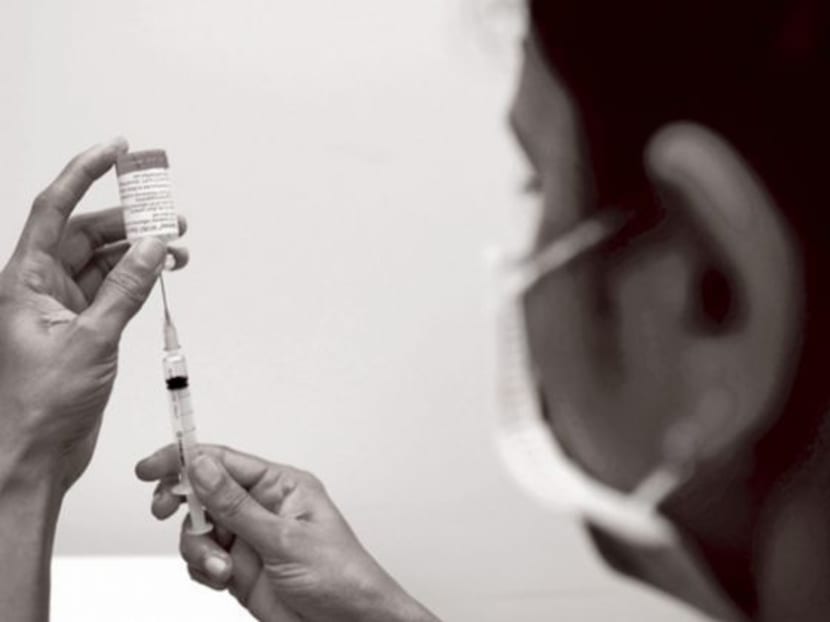Doctors suggest free flu vaccines to boost adult immunisation rates
SINGAPORE — Ms Emilia Nathasha cannot recall the last time she went for a vaccination.

Immunisation rates among adults here are largely dismal — even for jabs, such as for the flu, that more people are aware of.
The National Health Surveillance Survey 2013, which covered 3,700 respondents aged 50 and above, found only 15.2 per cent had received seasonal influenza vaccination in the past year. TODAY file photo.
SINGAPORE — Ms Emilia Nathasha cannot recall the last time she went for a vaccination.
“Was it Secondary Three, or Secondary One? I know for sure (that) once I finished school, I never took any (more vaccines),” said the 38-year-old project manager.
It was not due to any reluctance or fear of needles — Ms Emilia simply did not know the vaccinations recommended for adults.
“For teenagers and young children, it will be written all in the health booklet,” she said.
Public relations consultant Joachim Leong said except before trips to certain countries, he does not see a need to get vaccinated. The 31-year-old said: “I personally don’t feel like I’m that sickly or have a weak constitution that would warrant me to get a vaccination…I feel that it is dependent on the individual’s own immune system.”
Ms Emilia and Mr Leong are hardly alone.
Immunisation rates among adults here are largely dismal — even for jabs, such as for the flu, that more people are aware of.
The National Health Surveillance Survey 2013, which covered 3,700 respondents aged 50 and above, found 15.2 per cent had received seasonal influenza vaccination in the past year.
A separate audit on pneumococcal vaccination at Bukit Batok Polyclinic in 2013 showed that despite interventions, the uptake of the vaccine among at-risk adults with chronic obstructive lung disease and asthma reached 5.9 per cent, noted infectious disease and public health expert Hsu Li Yang of the Saw Swee Hock School of Public Health. Pneumococcal disease can lead to pneumonia, bacteremia and meningitis.
Announcing a National Adult Immunisation Schedule last weekend, Senior Minister of State for Health Lam Pin Min noted low awareness of the benefits of adult vaccination, which protect individuals as well as their family members at risk of various vaccine-preventable diseases.
The new schedule comprises seven types of vaccines that protect against 11 diseases such as the flu and hepatitis B. It will provide guidance to those aged 18 and older, said the Health Ministry.
To encourage take-up of important vaccinations, Dr Lam said Singaporeans who fall within the target groups will be able to use up to S$400 of their Medisave savings to pay for the vaccinations from Nov 1 at hospitals, polyclinics and private clinics on the Community Health Assist Scheme.
Doctors TODAY approached welcomed the new schedule but stressed more will need to be done to get adults to go for the necessary jabs.
While many patients know of influenza jabs, protection against diphtheria or tetanus “are off the radar”, said general practitioner Tan Tze Lee. In addition, many people “do not understand the need for vaccinations”, said Dr Tan.
There are patients who “don’t feel that they need” to be vaccinated, said Dr Sunil Kumar Joseph.
“People think that it would not happen to them, so they will ask why they need to get the vaccination,” he said.
Besides public education, doctors suggested other ways to combat the general apathy towards adult vaccination.
Consultations for pre-travel vaccination provide a “good opportunity to educate about other important vaccines”, said Dr Sunil.
Cost is another barrier, especially when patients have to pay upfront for vaccinations, said Dr Vincent Chua. A pneumococcal jab, for instance, can cost around S$60 to S$80 at a private clinic.
“When some patients know they have to pay upfront for a vaccine, there...will be some reluctance,” he said.
“I would even propose providing the influenza vaccine free to adults and children annually in order to increase the vaccine uptake,” said Assoc Prof Hsu.
Allowing the use of Medisave is helpful but must be coupled with efforts by healthcare workers and the Health Promotion Board to increase awareness and acceptance of adult vaccination, he said.
Aside from the impact on individuals who get diseased or die, adult vaccine-preventable diseases exact “considerable” healthcare costs, he added.
Some of the groups recommended by the Health Ministry for various vaccines could also be broadened, said Assoc Prof Hsu.
The influenza vaccine should be recommended for all adults unless there are specific contraindications such as allergy to the vaccine, for instance, said Assoc Prof Hsu. The ministry is recommending it to persons aged 65 and above, pregnant women, those whose immune systems are compromised or who are receiving long-term or intermediate care services, among other groups.
There is also growing evidence that vaccination of young men and boys against the human papilloma virus (HPV) – associated with anogential warts and penile, anal and oropharyngeal cancers – is beneficial, he said. The ministry is recommending it for females aged 18 to 26.
It “would be nice” to see the herpes zoster (shingles) vaccine listed on the schedule but Assoc Prof Hsu said he could understand why it is not — a relatively smaller public health impact and a relatively expensive vaccine that costs about S$240.
The new schedule will help in spreading the message that vaccinations are just as relevant to adults, doctors said.
“Even adults will benefit from them – if the adults have never been previously vaccinated (measles, chickenpox, Hepatitis B); if the vaccine has only short term efficacy (influenza), or in those cases where the childhood vaccine effectiveness can wear off over time (for diphtheria and tetanus),” said Assoc Prof Hsu.






